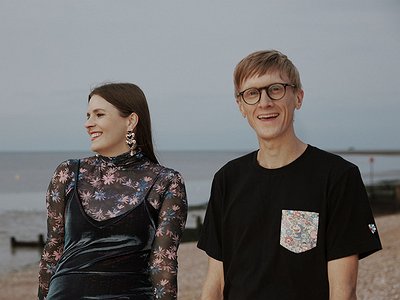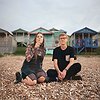Part 2
Tell me a bit about your current instruments and tools, please. In which way do they support creative exchange and collaborations with others?
JAS: Most of these things started out with this simple little music computer that I’ve been learning to program, called Norns. It’s funny because in my studio littered with huge, vintage bits of music gear this object that fits in the palm of your hand has been the most captivating thing for me.
That said, the tech side of things, which I love, is something that I try to keep to the side when we get to talking about music. I’ve been making music for many decades now and seen the tech change but in fact the task of making music has not really changed. Sure, plugins look better but that doesn’t help you make music.
ALEV: My current instrument and tools are really my voice, the words I collect and any recording device … I have started to more and more embrace the fact that sometimes the track will not be the best recording you can produce but the beauty of what was at hand also plays a role in the creativity and the creation.
Before you started making music together, did you in any form exchange concrete ideas, goals, or strategies? Generally speaking, what are your preferences when it comes to planning vs spontaneity in a collaboration?
JAS: This time I wanted Alev to just make a change, alter the way the tracks worked, and I didn’t want to influence that much at the outset because I’d already established that my viewpoint was what was blocking progress on the tracks. So I guess that’s a fairly spontaneous approach?
However I think a lot about process and making systems that might be interesting, which is a pretty planning based approach? I certainly don’t imagine myself as a spontaneous type, I make lists and stuff like that.
ALEV: I make lists but only when it is production and scheduling related, not really when it comes to creating. I start. Random times. Random places … it comes out whenever it’s ready. I schedule exercising my craft … I make a release plan too. But I think that’s it?
Describe the process of working together, please. What was different from your expectations and what did the other add to the music?
JAS: My expectation was that Alev would see the tracks differently enough to see a way forward with them but similarly enough that her direction would be a nice surprise rather than just a surprise.
ALEV: Total freedom. I heard stuff, I sang what I heard, I made the track my own. Then Jas, and I know and expected this to happen, would mute and mould some stuff and then we could have a joint track :)
Is there a piece which shows the different aspects you each contributed to the process particularly clearly?
Alev: I think all of them really … none of the pieces would be what they are without the other's contribution and each of them show that in equal measures I think ...
What tend to be the best collaborations in your opinion – those with artists you have a lot in common with or those where you have more differences? What happens when another musician take you outside of your comfort zone?
JAS; Any time you work with someone and their methods or approach to music or their taste diverges from your own you need to find a way to relate to this and it’s effort. Often, it’s well worth it.
No one’s approach to music is right and getting a glance at it from a different angle is a real privilege.
ALEV: What he said!
Decisions between creatives often work without words. How did this process work in this case?
JAS: Yeah, I think this true. I was really shy of doing remote collabs, especially with friends, because I thought that they would miss this aspect.
In this case the bulk of the music was done remotely and I felt that the process was really great. It gave Alev space to re-approach the music without me there saying ‘no, this is the downbeat here’ which would have ruined the outcome.
ALEV: Hehe yes ... I ignored a lot of the downbeats for sure :D But I think even with you in the room I would have then said, ah yes but look. And we would have made it through.
As mentioned above, I think we talk with on another frequently without meeting or picking up the phone.
What are your thoughts on the need for compromise vs standing by one's convictions? How did you resolve potential disagreements in this collaboration?
JAS: I love compromise! It’s such an underrated thing! The standard story of an artist is littered with this chat about uncompromising expression and I think it’s total bullshit.
Certainly, the answer isn’t always an average of any given two ideas, sometimes that’s the worst of both worlds. And just saying whatever to everything isn’t it either. So, finding a way to satisfy everyone is not simple, possibly not possible? But the process is worth putting effort into.
I see this a lot with bands. At the outset there’s this mutual goodwill that drives people to find ways to accommodate multiple viewpoints. It’s work. And over time you frequently see this goodwill erode and the dynamic becomes much less charming.
ALEV: Me too, I agree compromise is great. I think it needs two ingredients … it works when with people like Jas who have this incredible musical integrity and their desire is only towards the music, not themselves. And you need to have your strong convictions, not for the sake of convictions, but because they define your artistry. And those tend to shape a way forward but not block.
And it is not many, usually more a feeling, a guiding light … It’s a fine line!
Was/Is this collaboration fun – does it need to be?
JAS: It doesn’t need to be but it was and it’s so much better when it is.
ALEV: I had a lot of fun, it was joyful. Yes Joy is more the word I would use and I believe making music should always be joyful.
It can be hard and annoying at the same time and also sometimes not fun, but the joy at the core is a must, for me at least.
Do you find that thanks to this collaboration, you changed certain parts of your process or your outlook on certain creative aspects?
JAS: Always.
ALEV: Always.
Collaborating with one's heroes can be a thrill or a cause for panic. Do you have any practical experience with this and what was it like?
JAS: I don’t think this is a particularly healthy dynamic? I’ve worked with a few people who could be described as reasonably famous and the only way I could approach it is by treating them as normal people, which they are.
Equally, I’ve worked with plenty of people with no ‘profile’ and no musical training and I have found their approach to music to be equally valid.
ALEV: I love working with people one would call heroes. There is SO much to learn.
If you admire someone's work and you get to be in the same room, just soak it aaaaaalll up. Nothing scary. I am not a fan of hierarchies in that way, so if someone is a true hero all collaboration will be eye to eye and there is an abundance to dive into.






